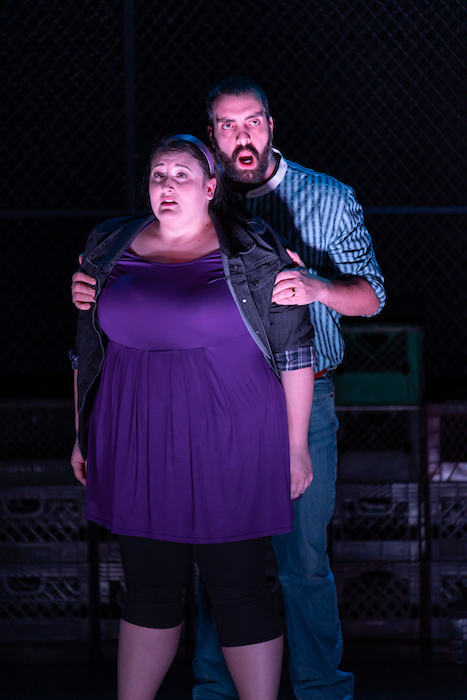Sankaram’s “Taking up Serpents” shows original, intriguing voice in WNO premiere

Alexandria Shiner and Timothy J. Bruno in Kamala Sankaram’s “Taking up Serpents,” presented by Washington National Opera Friday night. Photo: Scott Suchman
Washington National Opera’s American Opera Initiative continues to present new, hour-length works. Now in its seventh year, the company’s annual festival turned to the multitalented singer, instrumentalist, and composer Kamala Sankaram. Her new opera, Taking Up Serpents, heard on Friday night in the Kennedy Center Terrace Theater, offers a glimpse into an obscure corner of life in the South.
Librettist Jerre Dye drew on his own childhood in a small town in Mississippi to create this story about the family of a Pentecostal minister in Alabama. A rough and hard-drinking man, known only as Daddy in the libretto, he finds the Lord, proving his faith to his congregation by handling venomous serpents. His daughter, Kayla, has fled his oppressive influence, when she gets a call from her mother, Nelda, that her father is in the hospital about to die from a snake bite.
Sankaram’s musical style ranges wide: she sang the title role of her opera Miranda, and she sings and plays the accordion in her crossover band Bombay Rickey. For Taking Up Serpents she has taken a deep dive into music of the rural south, bringing the twang of the guitar into the orchestra pit and the straight-toned braying of shape-note singing onto the platform. She has woven these sounds into a more traditional operatic fabric in an utterly original way.
Alexandria Shiner, the dynamite Berta in last spring’s Barber of Seville, shone brilliantly as Kayla in this small cast. She focused her powerful soprano voice with precise intonation and a broad range of dynamics and color. Her dramatic sensibility carried the opening scene, as Kayla takes a break from her job as a cashier at Save Mart, to muse about moths circling lamps in the parking lot, accompanied by a fluttering flute melody and twinkling lights hung above the stage.
Mezzo-soprano Eliza Bonet seemed tentative at first as Nelda, Kayla’s beleaguered mother, but it became clear that this was a dramatic choice rather than vocal weakness. Sankaram shifts the focus of the hospital scene, where mother and daughter are reunited at the dying father’s bedside, to Nelda. Bonet delivered this scene with forthright intensity, making the opera’s climactic melodramatic twist almost believable.
Timothy Bruno, an alumnus of WNO’s Domingo-Cafritz Young Artists program, deployed his potent, rough-edged bass voice to characterize the misogyny and righteous anger of Daddy. He was absolutely loathsome in the pre-conversion scene, in which he drunkenly vaunts his power and influence over 10-year-old Kayla, played by a silent supernumerary double as Shiner narrated her memories.
Three other Domingo-Cafritz Young Artists—soprano Marlen Nahhas, mezzo-soprano Hannah Hagerty, and tenor Arnold Livingston Geis—filled out several minor roles each. Effective on their own, they did not do as well in the music that accompanies Kayla’s bus trip back to see her parents. This music is meant to sound nasal and uninflected, but the lack of instrumental accompaniment when it began left them somewhat at sea in terms of intonation.
Russian conductor Lidiya Yankovskaya made a strong WNO debut at the podium, skillfully bringing together the disparate sounds in the pit.
A highlight, for both eye and ear, was the occasional use of multi-colored whirly tubes to signal the act of remembering; swung through the air, they created a sound that is part human voice and part synthesizer. In another coup, Sankaram cleverly wove an ostinato, begun by electric guitar and continued by piano, into the whole of the hospital scene to evoke the beeping of the monitoring equipment.
Director Alison Moritz brought the same visual economy to this effective staging as in her work on Missy Mazzoli’s Proving Up last year. With minimal set pieces the mostly empty stage was transformed into little backdrops for the crazy shopping ensemble at Save Mart, the white-lit hospital room, or the ambling passenger bus, illuminated by passing streetlamps.
Sankaram and Dye’s only misstep came in the bathos of the opera’s conclusion, which a took a turn toward the soap-operatic. Both Nelda and Kayla are only too happy to be free of Daddy, but that liberation is expressed in actions or words that went over the top in ridiculous ways. Hopefully, some revision of the finale will be made. But even with that lapse, Kamala Sankaram’s Taking Up Serpents is still a major contribution from an intriguing new compositional voice.
Taking Up Serpents will be repeated 2 p.m. Sunday. kennedy-center.org; 202-467-4600


